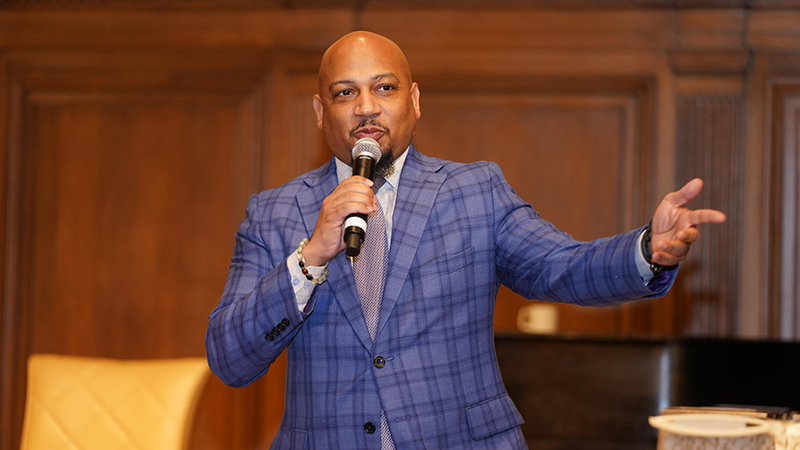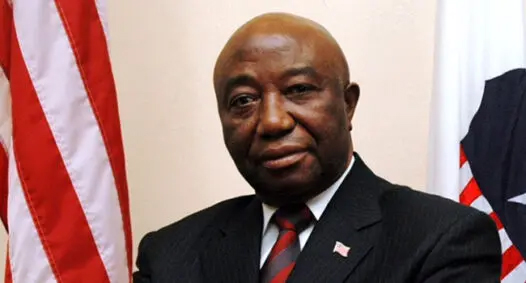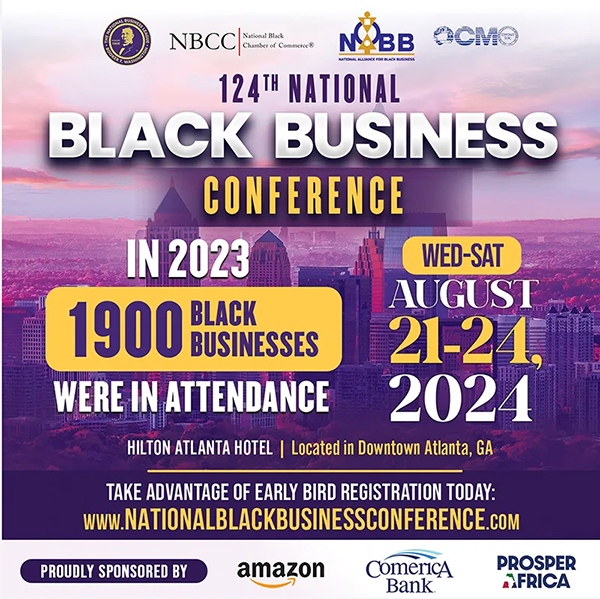As planners for the 124th National Black Business Conference, August 21-24 at the Hilton Hotel in downtown Atlanta get ready to assemble, the visionary leadership of Booker Taliaferro Washington and the organization he founded – The National Negro Business League (NNBL) – stands boldly in the forefront.
Washington (April 5, 1856 – November 14, 1915) was an American educator, author, and orator, who convened its inaugural National Negro Business Conference in Boston, Massachusetts, on August 23, 1900. Washington stressed the importance of business development and enterprise ownership as a core function to lead African American people toward economic liberation, independence, and freedom.
“I have learned that success is to be measured not so much by the position that one has reached in life as by the obstacles which he has overcome while trying to succeed,” said Washington, in his 1901 book, “Up from Slavery: An Autobiography.”
Fast forward to now. As the National Business League (NBL) – the modern-day name of the organization Washington founded – approaches the remarkable milestone of its 125th quincentennial celebration next year, this foundational event takes on even greater significance.

Dr. Ken L. Harris, Ph.D., the 16th president and CEO of the organization Washington founded, says it’s an “absolute honor” to carry on the legacy and heritage of Washington.
“His vision created the nation’s first and oldest trade association for black businesses and professionals,” Harris says. “Booker T. Washington had it right. His message is more relevant 124 years later… to maintain the type of enterprise ownership and development that would make economic freedom, liberation, and equality more of a reality.”
NBL, alongside esteemed partners and co-founders of the National Alliance for Black Business—the National Black Chamber of Commerce (NBCC), the World Conference of Mayors (WCM), and over 50 national organizations stand united as cohosts of the National Black Business Conference.
Deeply rooted in history and legacy, these institutions converge under a “Unified Black Business Agenda,” continuing this year’s conference themed “WE ARE TOGETHER.” This momentous gathering resonates with the collective voice of Black business leaders, both domestically and abroad, symbolizing unity, strength, and purpose as we honor and celebrate National Black Business Month 2024.
“At the core of the black community and society, there should be a thriving enterprise and entrepreneurial community built on ownership and development of our skills,” Harris says. “And that it seems to be the 60+ years, post-civil rights, where we are returning because of the failed integration project that did not have an economic platform attached to it.”
For the first time in global history, the nation’s leading Black business organizations have aligned towards a unified Black business agenda and conference. This year’s conference will assemble the world’s most influential entrepreneurs, professionals, corporate partners, political dignitaries, and women during these unprecedented post-pandemic times of continued economic exclusion, oppression, and uncertainty.
The combined value for three days of commerce-driven education, networking, exchange, and activity with events and functions tailored to meet the attendee and partner expectations, accessing a combined alliance of 120,000+ members and 400+ chambers/leagues throughout the country and abroad.
The global appeal is emerging as the “new normal” as the conference hosts Pan-African Diaspora Day to begin the galvanization of global economic affairs and international engagement and commerce-driven activity.

A highlight of the 124th Black Business Conference will be the special guest speaker, President Joseph Boakai, who in January became the 26th president of the West African country, the Republic of Liberia. Boakai’s address will be August 23rd at the Pan African Diaspora Business Luncheon.
Liberia began in the early 19th century as a project of the American Colonization Society (ACS), which believed black people would face better chances for freedom and prosperity in Africa than in the United States. Between 1822 and the outbreak of the American Civil War in 1861, more than 15,000 freed and free-born African Americans, along with 3,198 Afro-Caribbeans, relocated to Liberia. Gradually developing an Americo-Liberian identity, the settlers carried their culture and tradition with them. Liberia declared independence on July 26, 1847, which the U.S. did not recognize until February 5, 1862. Liberia was the first African republic to proclaim its independence and is Africa’s first and oldest modern republic.
Harris says what’s special about President Boakai’s visit to this year’s conference is that it celebrates an event that happened four decades ago in Liberia.
“This occasion is important because 40 years ago, the World Conference of Mayors hosted its first national conference in Monrovia, Liberia. And now it’s coming full circle,” he says. “So, should I say, since we went home first, now Liberia is coming to the United States to continue the work that was started 40 years ago, except now, we are focused on black businesses.”
The organization that Washinton founded 124 years ago is evolving with the times. A play on the lyric by 1960s poet, jazz musician, singer, and spoken word artist, Gil Scott-Heron, says: “THE REVOLUTION WON’T BE TELEVISED; IT SHALL BE DIGITIZED…” The website states that “one million black businesses to be digitized by 2028.”
“We’re not reinventing the wheel, just putting some Armor All on the tires,” Harris says. “The foundation is the same, the vision is secure.
“We’re in an age of digital technology. And the age where we have the ability now, to not only have a knowledge-based economy built on that technology but there are no longer borders,” he explains. “Technology allows for us to go beyond our normal confines as where we used to have black business districts, now we can build a truly global economy.”

Join the 124th National Black Business Conference in Atlanta and network with entrepreneurs, collaborate with business leaders, and empower your business.
#BlackBusiness #EconomicEmpowerment #BookerTWashingtonLegacy
Post Views: 78


